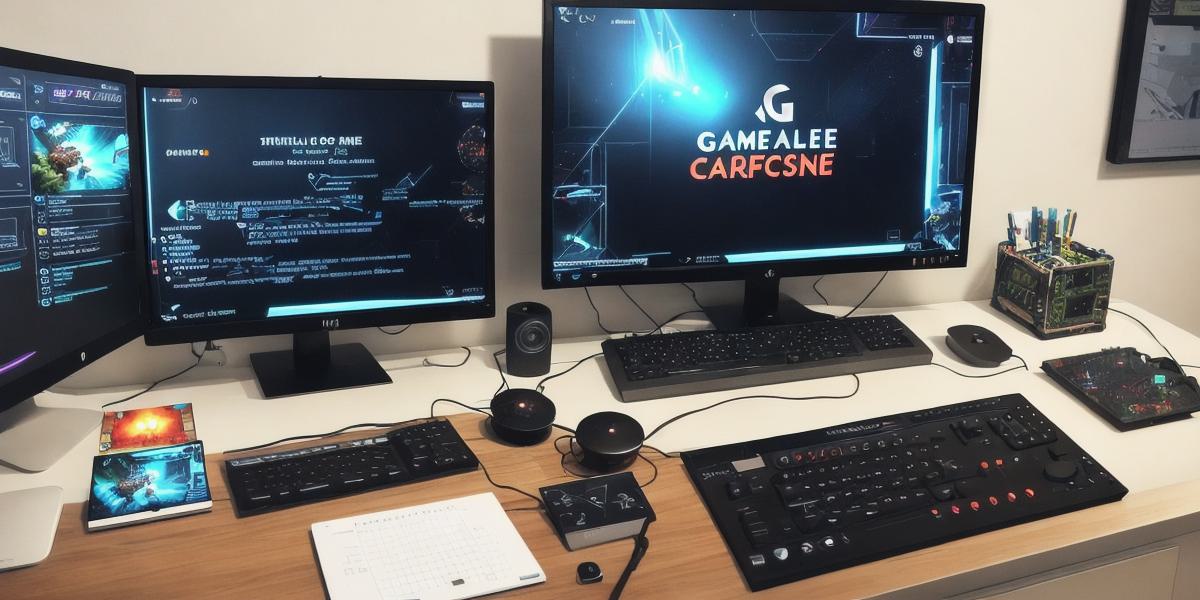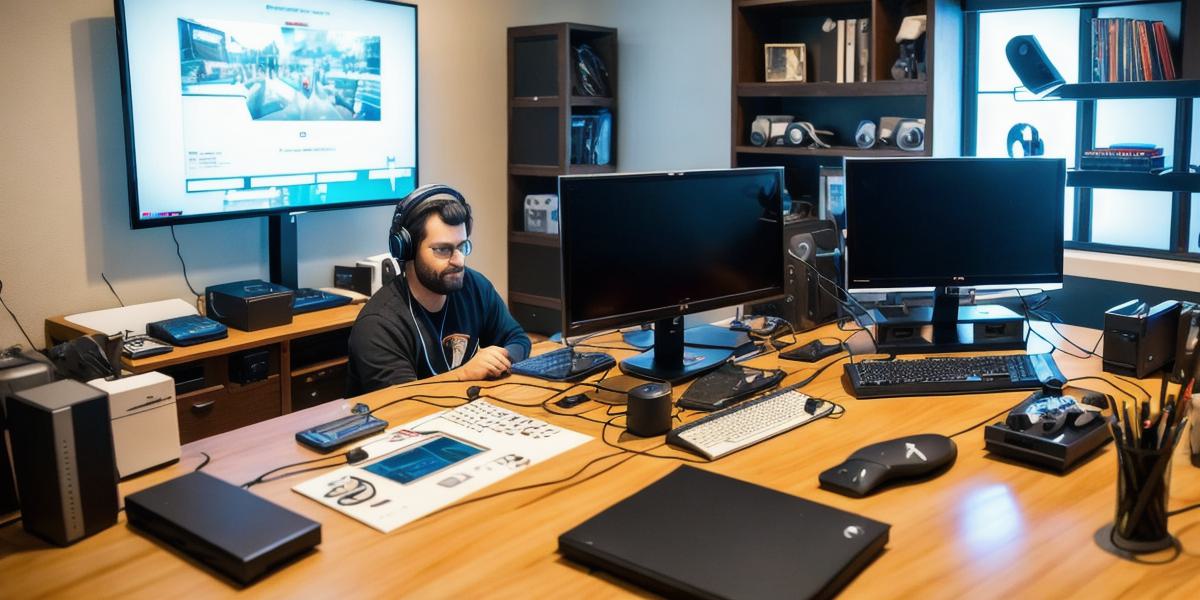If you’re an aspiring game developer, you might wonder if it’s difficult to break into the gaming industry. The answer is yes – game development can be a challenging field that requires a combination of technical skills, creativity, and business acumen. However, with the right knowledge and tools, anyone can learn how to develop games and succeed in this exciting industry.
In this article, we’ll explore some tips and tricks for getting started in game development, including how to overcome common challenges and pitfalls, as well as how to leverage your skills to grow your career and stand out in the competitive gaming market.
Why is Game Development Difficult?

Game development can be difficult for a number of reasons. Firstly, it’s an industry that requires a wide range of technical skills and knowledge, from programming and art design to game theory and project management. Additionally, the process of creating a game involves a lot of planning, collaboration, and iteration – which can be time-consuming and complex.
Moreover, the gaming market is highly competitive, with many talented developers vying for attention and recognition. This means that in order to succeed, you’ll need to not only have the technical skills and knowledge necessary to create high-quality games, but also be able to effectively market and promote your work.
Getting Started in Game Development
Despite these challenges, getting started in game development is still possible with the right resources and mindset. Here are some tips and tricks for getting started:
- Learn the basics of game development: Before you can create your own games, you’ll need to have a solid understanding of the fundamentals of game development. This includes learning programming languages like C++ or Unity, as well as basic game design principles like level design and user interface (UI) design.
- Start small and iterate: One of the best ways to get started in game development is to start small and iterate on your work. Instead of trying to create a full-fledged game all at once, start with a simple prototype or concept, and then build from there. This will allow you to test and refine your ideas as you go, without wasting too much time and resources.
- Build a portfolio: As you work on your games, it’s important to build a portfolio that showcases your skills and experience. This can include screenshots, videos, or even playable demos of your work. Having a strong portfolio will help you stand out in the competitive gaming market and attract potential employers or clients.
- Network and collaborate: Game development is a highly collaborative field, so it’s important to network with other developers and industry professionals. This can include attending game jams, joining online forums and communities, and reaching out to potential mentors or collaborators. By building strong relationships in the gaming community, you’ll be more likely to find opportunities to work on exciting projects and grow your career.
- Be patient and persistent: Game development is a long-term process that requires a lot of patience and persistence. It can take months or even years to create a high-quality game, so it’s important to stay motivated and focused throughout the process. Additionally, don’t be afraid to ask for help or advice from more experienced developers – they can provide valuable guidance and support as you work towards your goals.
Tips for Overcoming Common Challenges in Game Development
While game development can be challenging, there are many techniques and strategies that you can use to overcome common obstacles and stay on track. Here are some tips for overcoming common challenges in game development:
- Stay organized: One of the most important skills for game developers is organization. This includes keeping track of deadlines, managing resources efficiently, and staying on top of project milestones. By staying organized, you’ll be able to work more effectively and avoid common pitfalls like missed deadlines or scope creep.
- Break down complex tasks: Game development often involves complex tasks that can feel overwhelming. To overcome this, it’s important to break down larger tasks into smaller, more manageable parts. This will allow you to focus on one task at a time and make steady progress towards your goals.
- Seek feedback and iterate: Another key skill for game developers is the ability to seek feedback and iterate on their work. This includes soliciting feedback from users or playtesters, as well as being open to constructive criticism and suggestions for improvement. By being willing to iterate and refine your work, you’ll be able to create games that are not only technically sound, but also fun and engaging for players.
- Stay up-to-date with industry trends: The gaming industry is constantly evolving, with new technologies and tools emerging all the time. To stay ahead of the curve, it’s important to stay up-to-date with industry trends and best practices. This includes attending conferences and workshops, reading industry publications, and participating in online communities and forums.

- Stay motivated: Finally, game development can be a challenging and rewarding field that requires a lot of motivation and perseverance. To stay motivated, it’s important to set clear goals and deadlines, celebrate small victories along the way, and remind yourself of the passion and excitement that you feel about creating games.
Tips for Succeeding in the Gaming Industry
Once you’ve overcome the challenges of game development and honed your skills as a developer, it’s time to think about how you can succeed in the gaming industry. Here are some tips for succeeding in the competitive gaming market:
- Develop a strong personal brand: In the gaming industry, having a strong personal brand is essential for success. This includes building a portfolio that showcases your skills and experience, as well as establishing yourself as an expert in your field through blog posts, speaking engagements, or other forms of content marketing. By developing a strong personal brand, you’ll be more likely to attract attention and opportunities from potential employers or clients.
- Stay up-to-date with industry trends: As we mentioned earlier, the gaming industry is constantly evolving, with new technologies and tools emerging all the time. To stay ahead of the curve, it’s important to stay up-to-date with industry trends and best practices. This includes attending conferences and workshops, reading industry publications, and participating in online communities and forums. By staying informed, you’ll be better positioned to take advantage of new opportunities and adapt to changing market conditions.
- Network and collaborate: Game development is a highly collaborative field, so it’s important to network with other developers and industry professionals. This can include attending game jams, joining online forums and communities, and reaching out to potential mentors or collaborators. By building strong relationships in the gaming community, you’ll be more likely to find opportunities to work on exciting projects and grow your career.
- Be adaptable: Finally, success in the gaming industry requires adaptability and flexibility. This includes being open to new ideas and approaches, as well as being willing to learn from failure and iterate on your work. By embracing change and constantly learning from your experiences, you’ll be better positioned to thrive in this dynamic and exciting industry.
FAQs
- Is game development difficult? Yes, game development can be a challenging field that requires a combination of technical skills, creativity, and business acumen. However, with the right knowledge and tools, anyone can learn to develop games and find success in the industry.
- How do I overcome common challenges in game development? To overcome common challenges in game development, it’s important to stay organized, break down complex tasks into smaller parts, seek feedback and iterate on your work, stay up-to-date with industry trends, and be adaptable.
- How can I succeed in the gaming industry? To succeed in the gaming industry, it’s important to develop a strong personal brand, stay up-to-date with industry trends, network and collaborate with other developers, and be adaptable.
- What skills are needed for game development? Game development requires a combination of technical skills, creativity, and business acumen. Additionally, effective communication, problem-solving, and project management skills are essential for success in this field.



